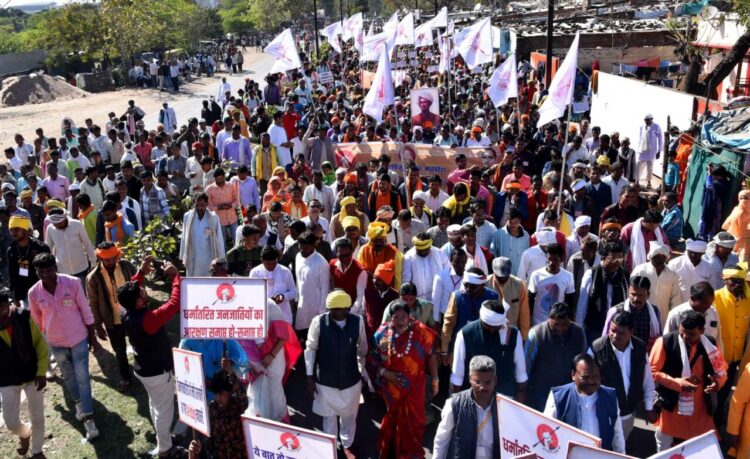“According to the Acts and Orders of the Government of India dated February 15, 1951, in reply to the memorandum submitted to the President of India by Dr HN Kunzru, MP and 15 other Members of Parliament dated December 17 1950, the Scheduled Tribes have been pointedly specified that only hose tribes who were properly classifiable as “primitive tribes as long ago as “Scheduled Tribes”. …….The Indian Christians have flagrantly flouted the provisions of the Constitutions by exploiting the Scheduled Tribes for the last 20 years {now read 70 years} because of the ignorance of the tribes, their pressure tactics and lack of special interest as to the welfare of the Scheduled Tribes on the part of the Government”. — Kartik Oraon, Tribal Leader and former Member of Parliament, in his letter to PM Ms Indira Gandhi, written on June 17, 1970, Annexure A, बीस बर्ष की काली रात (Dark-night of Twenty years), Reproduced by Janjati Suraksha Manch in January 2009
The delisting debate is back, yet again. Tribals across the country are organising rallies, submitting memorandums to the competent authorities and trying to build public opinion about their demands related to reservation, faith and culture. According to them, claiming Scheduled Tribe (ST) status by the people who have converted to Christianity and Islam is the root cause of their continued marginalisation. Janjati Suraksha Manch, a forum for the protection of tribals, is spearheading this movement in memory of Kartik Oraon, a Congress parliamentarian, who had initiated the debate on this issue way back in the 1960s. Unfortunately, like many other issues, this critical issue of tribal rights and inclusion has been either trivialised or communalised with a political prism. Though the delisting is a complex case, three core dimensions are associated with it.
The concept of tribals evolved and imposed during the British period has been problematic due to their colonial construct. Even if we continue with the same conceptualisation, the criteria indications of primitive traits are distinctive faith, culture, and geographical isolation. The Christian Missions that are relentlessly carrying out evangelical activities have benefited during the colonial period. After Independence, even after due diligence by the Constitution makers, missionaries supported by global Churches and their funding used their might to interpret the right to religious freedom as equivalent to the right to conversion, by hook or crook. Most of these conversions take place in the name of equality, dignity, and access to education, health and employment. The most critical outcome of this ferocious conversion process is uprooting the people from their faith and culture.
The fundamental question arising from this non-Bharatiya phenomenon of proselytisation by various Churches, especially in tribal areas, is – whether a member of the Scheduled Tribe should continue to be treated as a Scheduled Tribe after conversion to another religion other than a tribal religion. If the conversion essentially is delinking a person from his faith, tradition, belief system and even language in most cases, then how reservation can continue for the converts is the natural question agitating tribals are asking.
The Scheduled Tribe (ST) status entitles them to reservation in jobs, education, and legislative bodies. There are other provisions related to minority institutions where the same converted tribal enjoys minority status. How can the same individual simultaneously enjoy religious minority and Scheduled Tribe status? Is this not a Constitutional anomaly? Article 341, about the similar provisions for Scheduled Castes (SCs), debars a converted person from availing caste-based reservations, though secularists do not follow it in letter and spirit. Article 342 does not mention this regarding STs, hence the demand for delisting through amendment.
Way back in the 1960s itself, Kartik Oraon had pointed out that the converted individuals avail maximum benefits (1:255 as the data of 1970) in comparison to original tribal practitioners of faith and traditions. A study conducted by the Centre for Policy Studies has also established that the tribals converted, especially to Christianity, are taking away the significant benefits of the ST reservations. According to some estimates, 18 per cent of converted individuals have laid claims over the 70 per cent of reservations meant for tribals. In comparison, 82 per cent of genuine ones continuing with their original faith get just a 30 per cent share. How to rectify this lopsided implementation of tribal welfare schemes and reservations is another set of questions that tribals are asking.
As explained by Kartik Oraon earlier and now by the protesting groups, the delisting debate is not against Christians but for tribals and their right to continue with their unique faith and tradition. Instead of reducing the debate to the usual secular-communal rhetoric based on vote-bank considerations, we need more sane and exhaustive deliberations on tribal rights to preserve and protect their original culture, customs, rituals and languages.




















Comments